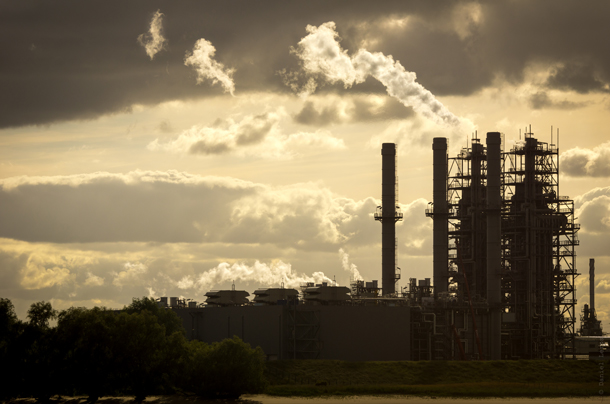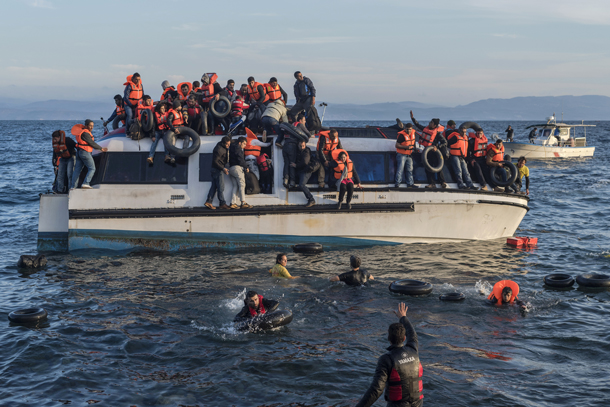Sobering Climate Risks
Air Date: Week of June 14, 2019

According to the Breakthrough National Centre for Climate Restoration’s paper, Existential Climate-Related Security Risk, scientists and politicians have focused too much on middle-of-the-road climate scenarios. If the planet warms by 3 degrees Centigrade from pre-industrial averages – which is the path that the current Paris Climate Agreement has us on – the planet could face a climate catastrophe. To avoid the worst consequences, David Spratt calls for immediate action and total decarbonization, or close to it, by 2030. (Photo: Daniel Lerps, Flickr, CC BY-ND 2.0)
If carbon emissions keep going up until 2030 it will be too late to avoid a ‘hot house’ Earth with a billion climate refugees starting in 2050, according to the Australia-based Breakthrough National Centre for Climate Restoration. These researchers warn the climate is changing faster than politicians and the public are responding, and say interventions on a scale never before seen during peacetime are needed right now. Host Steve Curwood talks with David Spratt, Research Director at the Breakthrough National Centre.
Transcript
CURWOOD: From PRI and the Jennifer and Ted Stanley Studios at the University of Massachusetts Boston, this is Living on Earth. I’m Steve Curwood.
So if the nations of the world stand by their present commitments under the Paris Climate Agreement, which allows global warming gases to increase until 2030, we are likely setting ourselves up for catastrophe. That’s according to researchers at the Australian Breakthrough National Centre for Climate Restoration, who warn political systems are moving much slower than the climate is changing. Their paper says the present targets would lead to 3 degrees Centigrade, or more, warming by 2050, which could create a “hothouse Earth,” making large regions of the planet uninhabitable, so there is no time left for incremental policy changes to decarbonize our economy. The researchers call for immediate, unprecedented intervention on a scale never seen before during peacetime, and warn that human civilization itself hangs in the balance.
Here to explain is David Spratt, research director for the group, on the line from Melbourne, Australia. Hi, David, welcome to Living on Earth.
SPRATT: Thank you very much.
CURWOOD: In your view, how well is the planet doing, are the governments around the planet doing, in limiting emissions such that we won't hit a three degree or higher increase by the year 2050?
SPRATT: Well, the answer is not very well at all. The commitments that countries have made so far at Paris and subsequently put us on a path for at least three degrees of warming.
CURWOOD: So how soon, then, do we need to start decreasing emissions to avoid that scenario?
SPRATT: The faster we decrease emissions, the lower the amount of future rises in the system. We have leading scientists like James Hansen saying that even two degrees is a recipe for disaster. We have new papers saying that if we get to two degrees, we may have a “hothouse Earth” consequence where the system keeps on going of its own accord. We really have to do this in 10 years, we really have to mobilize to rebuild our industrial system, to rebuild our energy system in 10 years. The sooner we do it, the more terribly dangerous warming we will avoid.
CURWOOD: And when you say we have 10 years, that is to begin lowering emissions or to get to really zero emissions, effectively?
SPRATT: I think to get to zero. The hotter it gets, the worse the impacts are. There are not moments where we step off the cliff, these impacts ramp up with the emissions. We are already in dangerous climate change now. We, now at the present level of warming, about 1.1 degrees, have created the conditions for the loss of the world's coral reefs, we have scientists telling us that in West Antarctica, the system is already primed for several meters of sea level rise. And you know what one meter of sea level rise will do to Florida, for example. Climate change is already dangerous.
CURWOOD: Now, what kinds of things, in terms of the natural world, are you predicting we'll see if we get to the three degrees Celsius by the middle of the century?
SPRATT: So we've looked at three degrees and said, what would that mean based on the peer-reviewed science? And we know from that science that, while we might have a sea level rise of half a meter by 2050, there will be many meters in the system because ice melts slowly, but once it starts, it doesn't stop very easily. We know that we will have lethal heat conditions, particularly in the tropical zone, particularly in Asia and West Asia, where it would simply be too hot for months a year for people to live without air conditioning. We will have changes in weather systems, in monsoons. We've seen the destabilization of the jet stream being incredible, hot and cold. We will be looking at a loss of perhaps a third of the ice from the Himalayas, and it is the melting of that ice that drives the water flow through the seven great rivers of Asia. We are looking at the subtropical zone drying out and desert-ifying. So there's peer-reviewed science saying the Sahara will jump the Mediterranean, into southern Spain, Italy and Greece. In the end, we're talking about lands and places where life will simply become unviable because it's too hot, too dry, or there's not enough water. And in the end, this is all about whether we have the land, the food, and the water for people to survive.
CURWOOD: Talk to me in some detail about your scenario, about the effect on human civilization. What happens to poorer countries? What happens in terms of displacement? What happens to food and what happens in terms of conflict, perhaps?

Climate change has already played a part in displacing millions of Syrians, says David Spratt, and by 2050 rising global temperatures and sea levels could force as many as a billion people to flee or relocate. (Photo: Ggia, Wikimedia Commons, CC BY-SA 4.0)
SPRATT: If we look, for example, at food, we can see a number of things intersecting here. As it gets hotter, some lands will desert-ify. I mean, for example, we have seen in Syria, a civil war that has internally and externally displaced 11 million people out of a population of 17 million, in part driven by the desertification of eastern Syria, a record-breaking drought. We can look across the Sahel, in Mali, in Darfur, for similar examples. So we have desertification. As it gets hotter, crop yields will decline. We already have the news recently of catastrophic declining in insect populations around the world, perhaps a loss of two and a half percent of the world's insect population each year. I mean, these are pollinators of our crops. These things cycle together into a food crisis. And when you have food and water crises, then you have social conflict. The United Nations has said that in another 30 years by 2050, we could have a billion people who will have to fight or flee because of land, water and food issues.
CURWOOD: So in your view, is this an emergency? Is this a crisis? Is this Armageddon?
SPRATT: No. This is not Armageddon, I don't think we should be doomerist. I think throwing up your hands and saying it's too late is really counterproductive. I think those tendencies are really disturbing, particularly for young people. There's been some misreporting saying we’ll all be dead in 11 years—that is not correct. The impacts ramp up with temperature. We have the climate impacts, we also have some other sustainability crises, in the sense that we are using more of the earth's resources each year than we can sustainably do. So there are multiple issues, there is the degradation of our oceans. So I think there are a number of issues all swirling together, and they will spiral up. I think we now have to say that this is the greatest threat to human civilization, and the greatest threat that human civilization has ever faced. The problem is that the status quo is a suicide.
CURWOOD: So how long do we have to act? The things you're projecting sound pretty dire to me.
SPRATT: How long did the United States have to act after Pearl Harbor? There are circumstances in which you have to act as fast as you possibly can. This threat may become overwhelming, we have to make this the number one priority of the society and throw everything at it. And that's where we are with climate change. This is not just another issue. This is the issue. If we don't solve this issue, then all the other things we care about will simply become irrelevant because we will be in such a state of international social crisis. Australia's leading climate scientist who was an advisor to our government for a number of years, Professor Will Steffen, he said we need something like a wartime mobilization to roll out renewable energy dramatically. So I think that's the idea we have to catch on to. This has got to be the primary target of economics and politics and government.
CURWOOD: So you're not talking about just small changes or incremental things, but you're saying that—
SPRATT: I'm talking about the day after Pearl Harbor. I’m saying, okay, we now realize we have a really big problem. How quickly can we act? I mean, can we call in, as happened at that time, the car companies and say, we have news for you, you have produced the last civilian car till the war is over. Now you're going to produce the things we need for this effort. And that period of the war was a period of incredible economic expansion in the United States. All available resources were thrown at the effort, and it was a period of high employment. It was not unprofitable for those companies, either. And it set up the base of the post-war boom. So these rapid mobilizations, these rapid transitions, we saw it in Japan, I mean, what used to be called the Japanese miracle, we see it in China, where the Chinese economy was transformed in 20 years, can be done if there is leadership.
CURWOOD: So how does one solve this problem? We do not have world government. Every nation is its own sovereign state. And there's a wide variety of opinions, and sometimes sovereign states produce Hitlers. And yet for the civilization to survive on this globe, virtually every nation—certainly the preponderance of nations that emit significant amounts of greenhouse gases—they've got to get aboard this.
SPRATT: Yes, I think we have an international policy-making system which has really produced some lowest common denominator outcomes in that, at the international conferences, everybody has to sign off on a deal, including Saudi Arabia and Abu Dhabi and Russia and so on. So, it's very easy to get the lowest common denominator actions. I think leadership may come from those countries who are more willing to act actually banding together and leading by example. Am I hopeful? Look, I hope so. But it requires leaders to lead and in the political class, we do not see a lot of that at the moment. Everybody is sitting and waiting. There aren't the Churchills, there aren’t the Roosevelts saying... This is the issue, if political leaders lead, the populations will follow. That's what's missing: genuine leadership.

David Spratt calls for massive, rapid climate intervention, comparing the effort needed to the United States’ mobilization after the 1941 bombing of Pearl Harbor. (Photo: U.S. Navy, Wikimedia Commons, Public Domain)
CURWOOD: David Spratt, the scenarios that you outline are so dire. To what extent do you think that the production of fossil fuel should be a matter of criminal justice?
SPRATT: I think there has been predatory delay by the fossil fuel lobby. There is now evidence, documents in the public domain, that the major fossil fuel producers have known the consequences of climate change since at least the mid-1980s. Are there criminal sanctions against that? That depends on the jurisdiction. But certainly the morality of continuing to produce products that you know will lead to the breakdown of human civilization seems a crime of the highest order to me.
CURWOOD: David Spratt is Research Director for the Breakthrough National Centre for Climate Restoration in Melbourne, Australia and co-author of Climate Code Red: The Case for Emergency Action. Thanks so much for your time today.
SPRATT: Thank you very much.
Links
CNN | “Climate Change Could Pose 'Existential Threat' by 2050: Report”
Breakthrough Center Policy Paper: Existential clmate-related security risk: A scenario approach
Living on Earth wants to hear from you!
Living on Earth
62 Calef Highway, Suite 212
Lee, NH 03861
Telephone: 617-287-4121
E-mail: comments@loe.org
Newsletter [Click here]
Donate to Living on Earth!
Living on Earth is an independent media program and relies entirely on contributions from listeners and institutions supporting public service. Please donate now to preserve an independent environmental voice.
NewsletterLiving on Earth offers a weekly delivery of the show's rundown to your mailbox. Sign up for our newsletter today!
 Sailors For The Sea: Be the change you want to sea.
Sailors For The Sea: Be the change you want to sea.
 The Grantham Foundation for the Protection of the Environment: Committed to protecting and improving the health of the global environment.
The Grantham Foundation for the Protection of the Environment: Committed to protecting and improving the health of the global environment.
 Contribute to Living on Earth and receive, as our gift to you, an archival print of one of Mark Seth Lender's extraordinary wildlife photographs. Follow the link to see Mark's current collection of photographs.
Contribute to Living on Earth and receive, as our gift to you, an archival print of one of Mark Seth Lender's extraordinary wildlife photographs. Follow the link to see Mark's current collection of photographs.
 Buy a signed copy of Mark Seth Lender's book Smeagull the Seagull & support Living on Earth
Buy a signed copy of Mark Seth Lender's book Smeagull the Seagull & support Living on Earth

